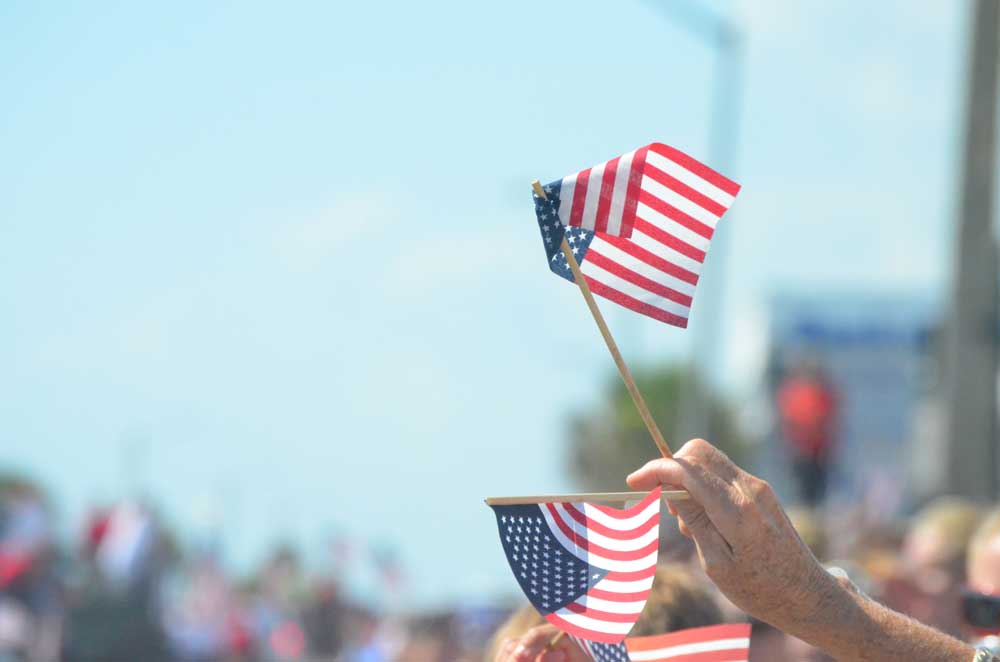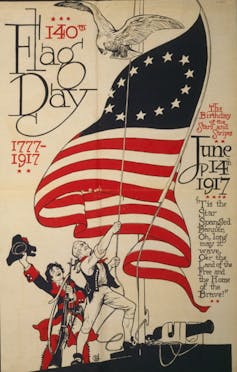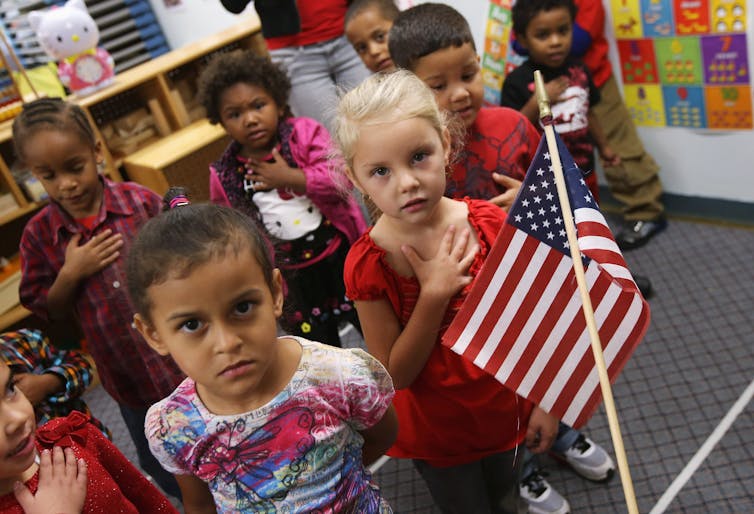
By Thomas S. Bremer
The Continental Congress, the legislative body for the newly declared United States, adopted an official flag on June 14, 1777. The delegates resolved that “the flag of the United States be thirteen stripes, alternate red and white: that the union be thirteen stars, white in a blue field, representing a new constellation.”
In the early years of the nation, though, this flag rarely appeared except in government and military displays.
That changed with the Civil War. As historian and author Marc Leepson writes in his book about the U.S. flag, Northerners began displaying it in homes and businesses to show support for the Union. After the war, the flag became a symbol of the reunified nation.
In 1885, schoolteacher Bernard Cigrand commemorated for the first time the anniversary of the adoption of the U.S. flag with his students at the Stony Hill School in Wisconsin. He subsequently launched a campaign to establish June 14 as Flag Day. In 1949, the U.S. Congress passed a resolution designating June 14 of each year as Flag Day.

Library of Congress
One of the more popular patriotic rituals honoring the U.S. flag is the recitation of the Pledge of Allegiance. For generations, schoolchildren have recited the pledge daily. It opens legislative sessions of the United States Senate and countless other government, public and private gatherings.
As a historian of religions in America, I view this ubiquitous ritual through the lens of American civil religion – the patriotic beliefs, ceremonies and symbols that are sacred to Americans.
Civil religion
The concept of civil religion originated in European Enlightenment philosophy. Philosopher Jean-Jacques Rousseau wrote in his 1762 treatise “Social Contract” that “a State has never been founded without religion serving as its base.”
American sociologist Robert Bellah used Rousseau’s concept of civil religion in his 1967 analysis of U.S. civic culture. Bellah claimed that an “American civil religion” persists alongside other religious traditions. American Christians, Jews and followers of other conventional religious traditions are also patriotic devotees of the national faith.
Bellah’s argument has inspired considerable debate. Numerous scholars have found the idea of civil religion useful. Bellah’s original essay noted references to God in presidential addresses and the sacred character of the Declaration of Independence and the U.S. Constitution. Other scholars have used civil religion to explain judicial interpretations of the U.S. Constitution’s religion clauses and in characterizing nationally significant places such as the Lincoln, Washington and Jefferson monuments in Washington, D.C., as sacred spaces.
Critics dispute Bellah’s assumptions. Historian of religion John F. Wilson, for instance, claimed that Bellah’s view of civil religion distorts the complex political, cultural and civic cultures of the United States. Wilson argues that Bellah’s concept reduces complex national cultures, including the religious elements, to a one-dimensional “religion” of the nation.
Additionally, historian Charles H. Lippy observes that Bellah’s interpretation of civil religion refers only to a particular segment of the U.S. population as “the prerogative of white males of economic privilege.”
In my book on American religious history, I use the concept of civil religion to understand patriotic ceremonies and commemorations. In particular, civil religion provides insight into historical controversies surrounding the U.S. Pledge of Allegiance.
Conflicts of faith
The Pledge of Allegiance began as a promotion in a children’s magazine. In his book about the pledge, author Richard Ellis describes an upsurge of devotion to the flag after the Civil War.
It included a movement to place the sacred banner in every school. A popular children’s magazine, “The Youth’s Companion,” joined the effort in 1892. It designated the 400th anniversary of Columbus’ discovery of America as the date for a national flag ceremony.
The magazine urged every school in the nation to observe a ritual flag salute. The ceremony was to include a Pledge of Allegiance composed by Francis Bellamy, a former Baptist minister. His original pledge read, “I pledge allegiance to my Flag and to the Republic for which it stands – one Nation indivisible – with Liberty and Justice for all.”
The flag salute caught on, and by World War I several versions were in use. An official flag code adopted in the 1920s included a revised version of Bellamy’s Pledge of Allegiance. It added “the flag of the United States of America” because of anti-immigrant sentiments; the original “my Flag,” many thought, could refer to immigrants’ native country. The flag code also stipulated a salute, with “the right hand over the heart” to be extended “palm upward, toward the Flag” upon saying the words “to the Flag.”

John Moore/Getty Images
Not all Americans were enthusiastic about the pledge. The most common complaints were religious. For instance, followers of traditions with strong pacifist commitments opposed reciting the Pledge of Allegiance. They objected to the implication that defending the flag would mean resorting to violence in violation of their religious beliefs. Others regarded the Pledge of Allegiance as a form of “idol worship.”
In 1935, the Jehovah’s Witnesses condemned the requirement for schoolchildren to recite the Pledge of Allegiance. They regarded the prescribed salute to the U.S. flag as similar to the German Nazi salute. The salutes used nearly identical hand motions. For the Jehovah’s Witnesses, the two salutes demonstrated “unfaithfulness to God.”
Reverence for the American flag
The Jehovah’s Witnesses challenged the multiple state laws requiring children to recite the pledge. Their case went all the way to the U.S. Supreme Court. The Court, however, rejected their religious argument in favor of “national unity.”
Public opinions, though, shifted with American involvement in World War II. The comparison to the Nazi salute made more Americans uncomfortable with the U.S. flag salute. In a subsequent case brought by Jehovah’s Witnesses, the Supreme Court reversed its previous ruling. On Flag Day in 1943, the court ruled that the government cannot “prescribe what shall be orthodox in politics, nationalism, religion, or other matters of opinion.”
The Cold War context after World War II brought an additional change to the Pledge of Allegiance. National leaders often emphasized the religious roots of the American nation in their condemnation of the official atheism of the USSR. They commonly used the term “under God” to characterize the United States in contrast to the “godless” Soviets.
Consequently, President Dwight Eisenhower signed a congressional resolution on Flag Day 1954. It added the phrase “under God” to the Pledge of Allegiance.
Celebration of Flag Day began in 1885, and the Pledge of Allegiance was first recited on Columbus Day in 1892. Although neither carries the weight of law today, resolutions of the U.S. Congress have recognized both.
Despite past controversies, reverence for the flag continues today for many U.S. citizens. Along with the Pledge of Allegiance, Flag Day celebrations, I believe, show an ongoing patriotic devotion in the civil religion of the people of the United States.
![]()
Thomas S. Bremer is Professor Emeritus of Religious Studies at Rhodes College.




























JimboXYZ says
I don’t have a problem with what anyone does for reciting the pledge of allegiance, singing the national anthem, just don’t be disrespectful for others. It’s like going to church, there are times the prayer is kneeling , other times standing. Don’t make it a form of protest knowing you’re going to annoy someone. If you don’t want to do it, fine, be somewhere else, because a lot of others are going to participate. Not my place to judge another in that regard, until they start to agitate & irritate those that participate. It’s somewhat like communion for a church service, participate is that’s what you wanna do. Know that it’s happening though, take a smoke break or even leave if you’re going to make a scene for the drama. Nobody will miss you or care, but stick around & disrupt the ritual and that’s going to be a problem when it’s confrontational. We did those rituals in America, if you’re here & American is it that big of a deal to respect the ritual when it’s a regularly scheduled moment ?
DaleL says
I have long been puzzled that only the first verse of the National Anthem is sung. The original Star Spangled Banner has four verses. Just once, how about a different verse?
As to pledging allegiance to a flag, any flag, it can be unifying, but also divisive. The addition of “under god” was unfortunate. America, as expressed in the 1797 Treaty of Tripoli, was not founded as a Christian nation. A significant number of Americans identify as having no religious affiliation. Even those with strong religious beliefs, Jehovah Witnesses for example, oppose reciting the pledge.
The knee jerk reciting of the Pledge of Allegiance at every single government meeting and in every single school, every f’in day is mind boggling dumb. How about saving the Pledge for times of crisis or really special occasions?
R.S. says
I’m with Thomas Paine: The world is my country, all mankind are my brethren, and to do good is my religion.
Anything else is too parochial to suit my tastes. We’re on this little blue dot in the vastness of the universe all on our little ole lonesome; any parochialism–IMMHO–is a bit looney. And so I’ll think to myself while standing without gesturing.
Laurel says
I always thought it weird to constantly have to pledge allegiance. Am I showing people, each and every time, that I haven’t changed my mind? Little kids in class could change their minds daily? Mass manipulation. One man once told me that patriotism was important to him, but I countered with “Wearing a pin on a lapel doesn’t guarantee patriotism.” As someone said (there are arguments as to whom) “Fascism will come wrapped in a flag while carrying a bible.” We have that in front of us now. A flag huger who claims to have many bibles, including one he sells, and loves them.
Far more upsetting to me, is to see people wearing the flag as a bathing suit, or shorts they sit on. I’ve seen our flag on the back of trucks so worn that they are not much more than threads. How is that respectful?
I also wish people would keep their religions to themselves. Do me a favor, don’t pray for me if I disagree with you. Oh, and stop blessing me when I sneeze! I sneeze a lot, and can’t possibly be blessed that much! Totally absurd.